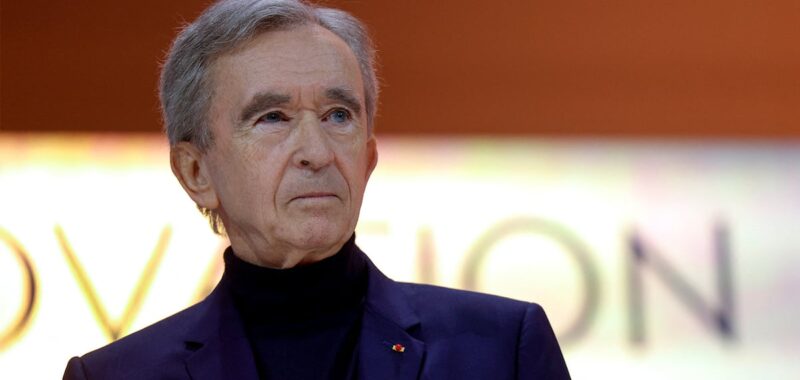
Growing fears that Donald Trumpâs tariff blitz will plunge the world into recession are dashing hopes in the $400-billion-a-year luxury industry that wealthy Americans might help to pull it out of the biggest slump in years.
One Wall Street analyst now expects worldwide sales of luxury goods will fall by as much as 2 percent this year, down from a previous forecast for 5 percent growth. If confirmed, that would mark the industryâs longest downturn in over two decades.
Bernstein analyst Luca Solca cited the fallout from Trumpâs Apr. 2 announcement of import taxes on major US trading partners as reasons for the downgrade.
âUncertainty, and the likely continuing rout in stock markets, are creating a self-fulfilling prophecy: a global recession,â he wrote in a note to clients.
Trumpâs tariffs were more sweeping than many market players feared, and have prompted retaliation from China, igniting a trade war that has left stock markets reeling.
Shares in sector leader LVMH are now down 2 percent since the start of the year, while Gucci owner Kering is down 31 percent. Hermes and Cartier owner Richemont, seen as better placed than many to weather a downturn thanks to their wealthier clientele, are down 8 percent and 6 percent respectively.
âThe tariff turmoil has increased worries,â said Mario Ortelli, managing partner at luxury advisory firm Ortelli & Co.
âThis is not helping the sentiment of the luxury consumer.â
All eyes will be on LVMH when it kicks off first-quarter financial reports on Apr. 15.
European fashion and jewellery houses like LVMHâs Louis Vuitton, Chanel and Richemont label Cartier had been counting on sales growth from wealthy Americans to help offset weak demand in China.
âEverything appeared so perfectly aligned,â at the start of 2025, said HSBC analyst Erwan Rambourg, as stock markets, the dollar, cryptocurrencies and US consumer confidence all rose.
But signs of weakness emerged even before Trumpâs tariff bombshell. Citi data released Tuesday showed US credit card spending on luxury brands fell 5 percent in March and February, year-on-year, after growing the previous two months.
Vontobel analysts warned at the start of April about growing âluxury fatigueâ and deteriorating US consumer sentiment.
Then came the market tumult unleashed by Trumpâs tariffs, potentially a key influence on U.S. spending given so much of the countryâs wealth is linked to equities.
Tricky Pricing
Groups like LVMH, Kering and Richemont are expected to draw on their brandsâ pricing power to shield profits from tariffs, but investors are worried that shoppers who can afford $10,000 leather handbags and gold bracelets could tighten their purse strings against a darkening economic backdrop.
In such conditions, pricing â already a delicate balancing act after record hikes in the pandemic â will be key as shoppers become âmore mindful, scrutinising their spend,â said Ortelli.
US import tariffs of 20 percent on goods from the European Union and 31 percent from Switzerland are expected to prompt European luxury brands to raise US prices by around 6 percent on average to protect profits, according to estimates from UBS.
Labels including Gucci, Chanel and Cartier already raised prices on some products in March by between 5 percent and 6 percent, according to Citi, which sees further high single-digit percentage increases in the coming weeks.
If companies donât hike prices, Barclays forecasts a negative impact on earnings before interest and tax of 1.5 percent at LVMHâs key fashion and leather goods division, and 2.4 percent at Prada and Hermes. Kering could take a 8.7 percent hit, due to lower pricing power at Gucci as it undergoes a revamp, while Swiss-based watchmaker Richemont could see a 7.1 percent decline, it estimated.
The US is the Swiss watch industryâs largest market, worth over twice as much in terms of exports as China last year, according to the Federation of the Swiss Watch Industry.
Europeâs luxury sector was largely spared tariffs during Trumpâs first term from 2017 to 2021, despite increased trade tensions.
This time, luxury executives are hoping that LVMH chairman and CEO Bernard Arnault, who attended Trumpâs inauguration, will be able to leverage his links with the US president to negotiate exemptions for the sector.
Arnault, who like Trump launched his career in New York Cityâs real estate scene in the 1980s, in January contrasted a âwind of optimismâ in the US with the âcold showerâ of taxes in France. LVMH did not respond to a request for comment on Arnaultâs current view of the U.S. market.
Slower Start
Sales reports for the three months to the end of March are expected to show luxury sector growth slowing to 0.5 percent from around 3 percent at the end of last year, according to HSBC estimates that were drawn up before the recent stock market dives.
LVMHâs fashion and leather goods division is forecast to report flat sales, according to Visible Alpha consensus figures.
Moncler, which reports on Apr. 16, is forecast to post a 1.3 percent rise in sales, while Hermes, on Apr. 17, is expected to deliver an almost 10 percent increase.
Sales at Kering, which reports on Apr. 23, are seen falling nearly 10 percent, weighed down by Gucci as the group seeks to engineer its turnaround.
But it wonât be easy to draw conclusions from the numbers.
âRecent days have thrown up a myriad of incremental unknowns,â Jefferies analysts said on Tuesday, waiting for âa modicum of stabilityâ before adjusting forecasts for the sector.
By Mimosa Spencer; Edited by Mark Potter
Learn more:
Trumpâs Tariffs Rock Fashionâs Supply Chain
Some of the most severe import duties announced Wednesday were aimed at apparel manufacturing hubs.

